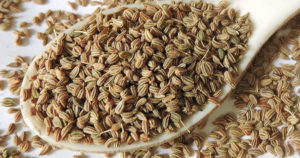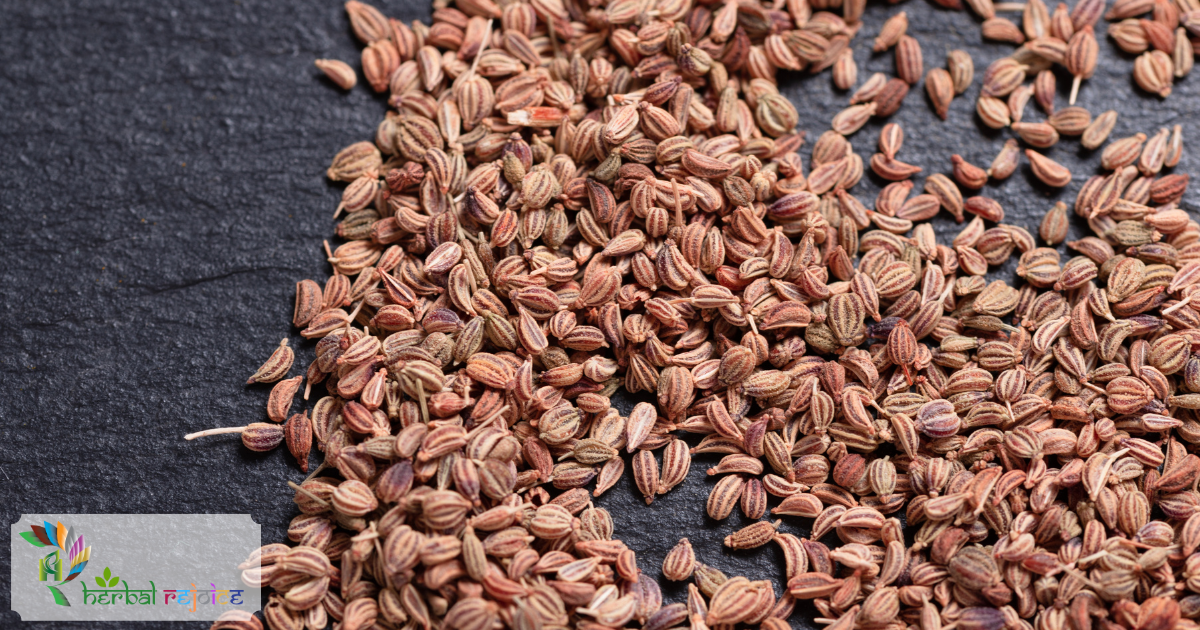Introduction:
Ajowan, scientifically known as Trychyspermum ammi Sprague, is a remarkable herb with a rich history of use in traditional medicine. In this article, we will delve into the various aspects of Ajowan, from its biological source to its chemical constituents, and explore the wide range of uses and benefits it offers.
Biological Source:
Ajowan consists of dried ripe fruits of the Trychyspermum ammi Sprague plant, which belongs to the Umbelliferae family.
Macroscopic Marvel:

Colour: Ajowan exhibits a yellowish-brown hue.
Odour: It emits an agreeable aroma.
Taste: Ajowan’s taste is aromatic and warmly reminiscent of thymol.
Size: The fruits are typically 1.7 to 3 mm long, 1.5 to 2.4 mm broad, and 0.5 to 1.5 mm thick.
Chemical Constituents: Unlocking Ajowan’s Potent Properties
Ajowan fruits boast a diverse composition, including:
- Volatile oil (2 – 4 percent)
- Fat (about 21 percent)
- Proteins (17 percent)
- Carbohydrates (25 percent)
Traces of tannin, glycosides, and steroidal substances have also been identified. The volatile oil is primarily composed of thymol (35 – 60 per cent), p-cymene (50 – 55 per cent), and terpinene (30 – 35 per cent). Additionally, pinene and dipentenes are among the other constituents present in the oil. Ajowan’s distinctive flavour and taste are attributed to thymol and its volatile oil.
Ajowan: Practical Companion for Holistic Wellness
Ajowan offers a wide array of applications in traditional medicine and beyond:
Antispasmodic: It is known to relieve muscle spasms.
Stimulant: Ajowan acts as a stimulant, invigorating the body.
Carminative: It helps alleviate gas and bloating.
Sore Throat and Bronchitis: Ajowan is recommended for treating these conditions.
Lotions and Ointments: Ajowan is used to prepare lotions and ointments to address chronic discharge.
Ajowan Oil: This essential oil, as well as dethymolized ajowan oil, serves as an antiseptic, antifungal, insecticide, and anthelmintic.
Oral Care: Ajowan oil is preferred as a deodorant in mouthwashes, toothpaste, and gargles. It also adds flavour to disinfectant soaps.
Culinary Wonders
In the culinary world, Ajowan brings a unique flavour profile. Raw Ajowan is akin to thyme but possesses a stronger and more pronounced taste.
Its slightly bitter and pungent notes and signature thyme-like fragrance make it an intriguing spice.
In Indian cuisine, Ajowan seldom graces dishes in its raw form. Instead, it is either dry-roasted or fried in ghee or oil to unlock its subtler and more complex aroma, reminiscent of caraway but brighter.
Ajowan has a natural affinity for starchy foods, elevating savoury pastries, bread, and parathas. It adds a delightful kick to snacks like Bombay mix and potato balls. It pairs wonderfully with green beans, root vegetables, lentil-based recipes, and dishes utilising chickpea flour, known as ‘Besan’ or Bengal gram flour.
Occasionally, it finds its way into curry powder, contributing to the rich tapestry of flavours in this popular spice blend.
Conclusion:
With its rich history and diverse applications, Ajowan stands as a versatile herb with numerous benefits. Whether used in traditional medicine or as a flavour enhancer in culinary dishes, Ajowan’s unique properties make it a valuable addition to your herbal repertoire.
However, as with any herbal remedy, it’s essential to exercise caution and seek professional advice, especially if you have underlying health conditions.
FAQs About Ajowan:
Is Ajowan a commonly used herb?
Yes, Ajowan is a widely used herb, especially in traditional medicine systems.
What is the primary active component in Ajowan?
Thymol is the primary active component found in Ajowan.
How does Ajowan benefit digestion?
Ajowan acts as a carminative, helping to alleviate gas and bloating.
Can Ajowan be used to treat respiratory conditions?
Yes, Ajowan is recommended for sore throat and bronchitis.
What are the uses of Ajowan oil?
Ajowan oil is employed as an antiseptic, antifungal, insecticide, and anthelmintic.
Is Ajowan oil used in oral care products?
Yes, Ajowan oil is often used in mouthwashes, toothpaste, and gargles for its deodorant properties.
How can I use Ajowan to address chronic discharge?
Ajowan can be included in lotions and ointments for this purpose.
What are the colour and odour characteristics of Ajowan?
Ajowan typically has a yellowish-brown colour and an agreeable aroma.
What is the recommended daily intake of Ajowan?
It’s important to consume at most 2.5 grams of dried Ajowan root daily.
Can Ajowan be used during pregnancy?
Pregnant individuals should consult with a healthcare professional before using Ajowan.
Is Ajowan effective in relieving muscle spasms?
Yes, Ajowan is known for its antispasmodic properties.
What are the potential side effects of Ajowan?
Side effects may include allergic reactions or gastrointestinal discomfort in some individuals.
Is Ajowan used in culinary dishes?
Yes, Ajowan is sometimes added to dishes for its flavour and digestive benefits.
Can Ajowan oil be applied topically?
Yes, Ajowan oil can be applied externally for various purposes.
Is Ajowan commonly found in health-food stores?
Yes, many health-food stores offer bulk Ajowan for purchase.
Is Ajowan a natural insect repellent?
Ajowan oil has insecticidal properties and can be a natural insect repellent.
Are there any contraindications for Ajowan use?
People with particular medical conditions or allergies should be careful and seek medical professional advice before incorporating Ajowan into their routines.
Can Ajowan be used to regulate cholesterol levels?
Some evidence suggests that Ajowan may help regulate cholesterol levels, but further research is needed.
Is Ajowan safe for children?
Ajowan should be used cautiously in children, and it’s advisable to consult a healthcare professional.
Can I consume Ajowan if I have diabetes?
Ajowan may have potential benefits for blood sugar regulation, but individuals with diabetes should consult a healthcare provider before use.
What are the cosmetic applications of Ajowan?
Ajowan oil is used in cosmetic products such as lotions and ointments. Additionally, it is employed in deodorants, mouthwashes, toothpaste, and gargles for its aromatic properties.
How does Ajowan oil contribute to oral hygiene?
Ajowan oil is used as a flavouring agent in mouthwashes, toothpaste, and gargles, providing both aroma and potential health benefits for oral hygiene.
Is Ajowan recommended for digestive issues?
Yes, Ajowan is traditionally used to improve digestion and reduce flatulence, particularly when cooked with beans.
Are there any aphrodisiac properties associated with Ajowan?
Ajowan seeds are believed to possess aphrodisiac properties, as per traditional Indian knowledge.
How does Ajowan impact respiratory health?
Ajowan is considered an expectorant used in respiratory treatments for conditions like bronchial pneumonia.
What is the antibacterial activity of Ajowan?
Ajowan exhibits antibacterial activity against specific strains, notably Staphylococcus aureus, making it a potential natural remedy.
Does Ajowan have antioxidant properties?
Yes, Ajowan possesses antioxidant effects, which can help combat oxidative stress and preserve the quality of certain oils and products.
How is Ajowan used in folk remedies for digestive problems?
Ajowan seeds, often mixed with a bit of rock salt, are consumed after meals in Indian folk remedies to aid digestion and alleviate irregular dietary issues.
Are there any toxic concerns related to Ajowan consumption?
Ajowan seeds and extracts are generally considered safe for consumption and do not pose significant health risks when used in moderation.
What is Ajowan salt, and how is it used in traditional remedies?
Ajowan salt is prepared by blending finely ground rock salt with Ajowan. It is traditionally used in folk remedies for digestive problems.
Can Ajowan seed oil impact human spermatozoa?
Ajowan volatile oils have been found to exhibit spermicidal properties in varying dilutions, impacting ejaculated human spermatozoa





